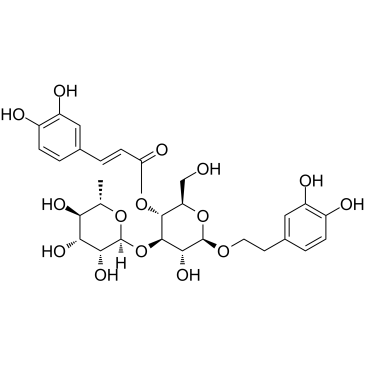
Verbascoside
CAS No. 61276-17-3
Verbascoside( Verbascoside | Acetoside | Kusaginin )
Catalog No. M18894 CAS No. 61276-17-3
Verbascoside is a protein kinase C inhibitor with antimicrobial, anti-inflammatory activities.
Purity : >98% (HPLC)
 COA
COA
 Datasheet
Datasheet
 HNMR
HNMR
 HPLC
HPLC
 MSDS
MSDS
 Handing Instructions
Handing Instructions
| Size | Price / USD | Stock | Quantity |
| 5MG | 52 | In Stock |


|
| 10MG | 77 | In Stock |


|
| 25MG | 162 | In Stock |


|
| 50MG | 255 | In Stock |


|
| 100MG | 435 | In Stock |


|
| 200MG | Get Quote | In Stock |


|
| 500MG | Get Quote | In Stock |


|
| 1G | Get Quote | In Stock |


|
Biological Information
-
Product NameVerbascoside
-
NoteResearch use only, not for human use.
-
Brief DescriptionVerbascoside is a protein kinase C inhibitor with antimicrobial, anti-inflammatory activities.
-
DescriptionVerbascoside is a novel Inhibitor of the Oligomerization of Pneumolysin.(In Vitro):Verbascoside acts as an ATP-competitive inhibitor of PKC, with an IC50 of 25 μM. Verbascoside shows Kis of 22 and 28 μM with respect to ATP and histone, respectively. Verbascoside has potent antitumor activity against L-1210 cells, with an IC50 of 13 μM. Verbascoside (5, 10 μM) suppresses 2,4-dinitrochlorobenzene (DNCB)-induced T cell costimulatory factors CD86 and CD54, proinflammatory cytokines, and NFκB pathway activation in THP-1 cells. (In Vivo):Verbascoside (1%) reduces the overall scratching behavior incidence as well as the severity of the skin lesions in 2,4-dinitrochlorobenzene (DNCB)-induced atopic dermatitis (AD) mice model. Verbascoside also blocks DNCB-induced expression of proinflammatory cytokine TNF-α, IL-6, and IL-4 mRNA in skin lesions. Verbascoside (50, 100 mg/kg, i.p.) does not modify chronic constriction injury (CCI)-induced cold allodynia. Verbascoside (200 mg/kg, i.p.) decreases hyper-sensitivity to cold stimulus, acetone, on day 3 in rats. Verbascoside also significantly reduces behavioral changes associated with neuropathy. Moreover, Verbascoside decreases Bax and increases Bcl-2 on day 3.
-
In VitroVerbascoside acts as an ATP-competitive inhibitor of PKC, with an IC50 of 25 μM. Verbascoside shows Kis of 22 and 28 μM with respect to ATP and histone, respectively. Verbascoside has potent antitumor activity against L-1210 cells, with an IC50 of 13 μM. Verbascoside (5, 10 μM) suppresses 2,4-dinitrochlorobenzene (DNCB)-induced T cell costimulatory factors CD86 and CD54, proinflammatory cytokines, and NFκB pathway activation in THP-1 cells.
-
In VivoVerbascoside (1%) reduces the overall scratching behavior incidence as well as the severity of the skin lesions in 2,4-dinitrochlorobenzene (DNCB)-induced atopic dermatitis (AD) mice model. Verbascoside also blocks DNCB-induced expression of proinflammatory cytokine TNF-α, IL-6, and IL-4 mRNA in skin lesions. Verbascoside (50, 100 mg/kg, i.p.) does not modify chronic constriction injury (CCI)-induced cold allodynia. Verbascoside (200 mg/kg, i.p.) decreases hyper-sensitivity to cold stimulus, acetone, on day 3 in rats. Verbascoside also significantly reduces behavioral changes associated with neuropathy. Moreover, Verbascoside decreases Bax and increases Bcl-2 on day 3.
-
SynonymsVerbascoside | Acetoside | Kusaginin
-
PathwayOthers
-
TargetOther Targets
-
Recptorp53| PARP1| PKC
-
Research AreaInflammation/Immunology
-
Indication——
Chemical Information
-
CAS Number61276-17-3
-
Formula Weight624.59
-
Molecular FormulaC29H36O15
-
Purity>98% (HPLC)
-
SolubilityDMSO : ≥ 6.3 mg/mL; 10.09 mM
-
SMILESO([C@H]1[C@H](OC(=O)/C=C/c2cc(O)c(O)cc2)[C@H](O[C@@H](OCCc2ccc(c(c2)O)O)[C@@H]1O)CO)[C@@H]1O[C@H]([C@H](O)[C@@H](O)[C@H]1O)C
-
Chemical Name[(2R,3R,4R,5R,6R)-6-[2-(3,4-Dihydroxyphenyl)ethoxy]-5-hydroxy-2-(hydroxymethyl)-4-[(2S,3R,4R,5R,6S)-3,4,5-trihydroxy-6-methyloxan-2-yl]oxyoxan-3-yl] (E)-3-(3,4-dihydroxyphenyl)prop-2-enoate
Shipping & Storage Information
-
Storage(-20℃)
-
ShippingWith Ice Pack
-
Stability≥ 2 years
Reference
1. Herbert JM, et al. Natural Products, 1991, 54 (6): 1595–1600.
molnova catalog



related products
-
Trierucin
Trierucin is a trierucic acid triglyceride from the seed oil.
-
37-dimethylocta-26-d...
37-dimethylocta-26-dienyl 5913-trimethyltetradeca-4812-enoate is?a chemical compound.
-
N-(2-hydroxyethyl)-N...
N-(2-hydroxyethyl)-Naphthalimide is a fluorescent probe for nucleic acid detection whose fluorescence can be burst.



 Cart
Cart
 sales@molnova.com
sales@molnova.com


